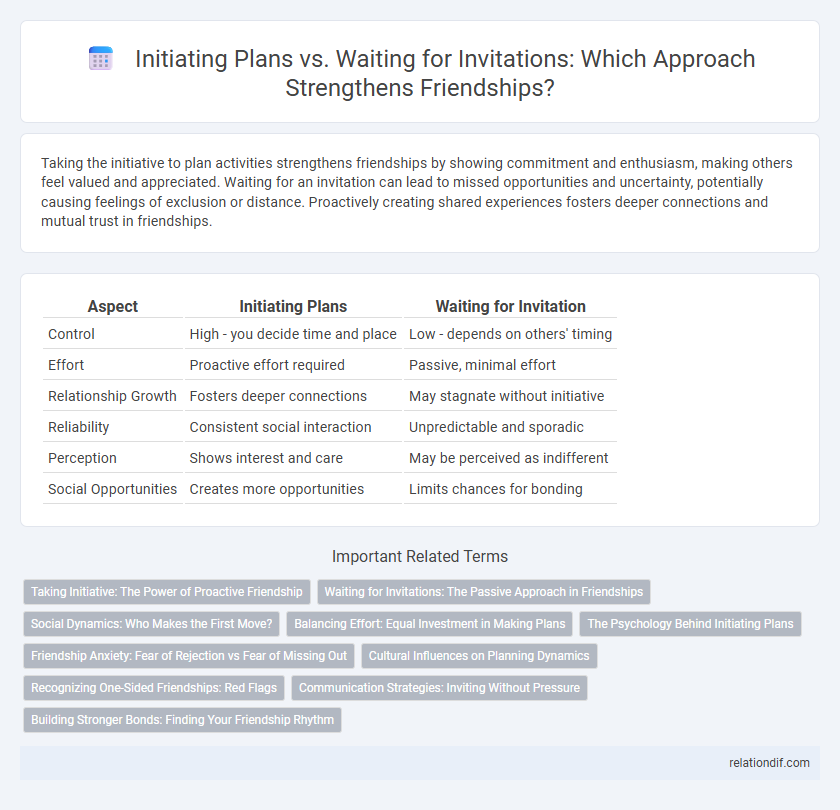Taking the initiative to plan activities strengthens friendships by showing commitment and enthusiasm, making others feel valued and appreciated. Waiting for an invitation can lead to missed opportunities and uncertainty, potentially causing feelings of exclusion or distance. Proactively creating shared experiences fosters deeper connections and mutual trust in friendships.
Table of Comparison
| Aspect | Initiating Plans | Waiting for Invitation |
|---|---|---|
| Control | High - you decide time and place | Low - depends on others' timing |
| Effort | Proactive effort required | Passive, minimal effort |
| Relationship Growth | Fosters deeper connections | May stagnate without initiative |
| Reliability | Consistent social interaction | Unpredictable and sporadic |
| Perception | Shows interest and care | May be perceived as indifferent |
| Social Opportunities | Creates more opportunities | Limits chances for bonding |
Taking Initiative: The Power of Proactive Friendship
Taking initiative in friendship demonstrates confidence and genuine interest, creating stronger, more reliable bonds. Proactively suggesting plans fosters mutual engagement and shows commitment to nurturing the relationship. Waiting passively for invitations can lead to missed opportunities and weakened connections.
Waiting for Invitations: The Passive Approach in Friendships
Waiting for invitations in friendships often leads to missed opportunities for deepening connections and can create imbalances where one friend appears less invested. This passive approach may signal disinterest or insecurity, making the relationship less dynamic and potentially causing frustration or detachment. Proactively initiating plans is essential to maintaining healthy, reciprocal friendships built on mutual effort and enthusiasm.
Social Dynamics: Who Makes the First Move?
In social dynamics, initiating plans often signals confidence and investment in the friendship, fostering stronger connections and clearer communication. Waiting for an invitation can create ambiguity and missed opportunities, as both parties might hesitate, unsure of the other's interest. Research shows that proactive social behavior frequently leads to more fulfilling and sustained friendships.
Balancing Effort: Equal Investment in Making Plans
Balancing effort in friendships requires both parties to initiate plans, fostering mutual investment and ensuring neither feels overlooked or burdened. Consistently initiating or waiting for invitations creates imbalance, which can lead to frustration or weakened bonds. Equal participation in planning nurtures trust, strengthens connections, and sustains long-term friendships.
The Psychology Behind Initiating Plans
Initiating plans strengthens social bonds by demonstrating proactivity and genuine interest, which triggers positive psychological responses such as increased trust and reciprocal affinity. Studies reveal that taking the initiative reflects confidence and reinforces a sense of belonging, while waiting passively for invitations can lead to missed opportunities and social anxiety. Neuroscientific research highlights that proactive engagement activates reward centers in the brain, promoting feelings of satisfaction and deeper friendship connections.
Friendship Anxiety: Fear of Rejection vs Fear of Missing Out
Friendship anxiety often stems from the fear of rejection when initiating plans contrasted with the fear of missing out when passively waiting for invitations. Individuals experiencing this dilemma may hesitate to suggest activities to avoid potential dismissal yet feel isolated if they do not receive invitations. Balancing proactive engagement with openness to inclusivity helps reduce social uncertainty and strengthens interpersonal connections.
Cultural Influences on Planning Dynamics
Cultural influences significantly shape how individuals approach initiating plans versus waiting for invitations, with collectivist cultures often emphasizing indirect communication and group consensus before proposing activities. In contrast, individualistic cultures tend to encourage proactive planning and direct invitations as expressions of personal initiative and autonomy. Understanding these cultural nuances enhances friendship dynamics by fostering mutual respect and reducing misunderstandings in social interactions.
Recognizing One-Sided Friendships: Red Flags
Consistently initiating plans without reciprocation often signals a one-sided friendship where effort is unbalanced. Key red flags include repeatedly waiting for invitations that never come and feeling undervalued or ignored in social dynamics. Recognizing these patterns allows individuals to reassess emotional investments and prioritize mutually supportive relationships.
Communication Strategies: Inviting Without Pressure
Effective communication strategies in friendship emphasize inviting without pressure by using open-ended questions and expressing genuine interest, which encourages positive responses. Proactively suggesting plans helps avoid misunderstandings caused by waiting for invitations, fostering mutual engagement and trust. Clear, respectful invitations create a comfortable environment where friends feel valued and free to accept or decline without guilt.
Building Stronger Bonds: Finding Your Friendship Rhythm
Initiating plans rather than waiting for invitations fosters proactive communication and shows genuine interest in nurturing the friendship. Consistently reaching out helps establish a reliable rhythm that strengthens trust and deepens emotional connections. Balancing initiative with receptiveness creates a dynamic where both friends feel valued and engaged, leading to more meaningful and lasting bonds.
initiating plans vs waiting for invitation Infographic

 relationdif.com
relationdif.com